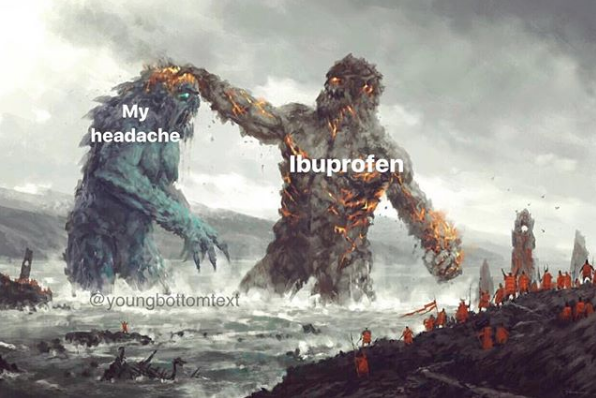
Advil and Motrin are ibuprofen, then you have Aleve (naproxen). Those are the over-the-counter ones. Prescriptions are Mobic (meloxicam), nabumetone, indomethacin, Toradol (ketorolac), diclofenac, Lodine, and the list goes on. All of these medications are in a class called non-steroidal anti-inflammatory drugs (NSAIDs).
I'm giving you this list because there is mounting evidence that these medications a) don't work as well as we'd thought and b) have some very serious long term side effects we're finding out more about.
NSAID's act by reducing the amount of prostaglandins you make in order to reduce inflammation. However, prostaglandins have a ton of other effects and are involved in the maintenance of just about AIDs and also stronger if they are taken every day and/or around-the-clock. every other organ system that you have. The effect is stronger with higher doses of NS
NSAID's work best and are best indicated for times when something is red and swollen. Think about a sprained ankle or broken bone and any rheumatologic conditions where the inflammation comes from inside the body, like gout or rheumatoid arthritis. They have variable efficacy for regular osteoarthritis as well.
For other things like headaches, stomach aches, back and neck pain and cough/colds, they are much less effective and oftentimes something like Tylenol (acetaminophen) or natural remedies work just as well and have less side effects.
The main side effect people know about with NSAIDs is related to their stomach. Last month I talked about how long term use of these can cause stomach and intestinal ulcers and sometimes a side effect is just that they cause an upset stomach without any real damage (this is a very quick onset effect).
The other side effects we see tend to happen either with long term daily use or use of very high doses and these include kidney failure, high blood pressure, heart failure, and heart attacks. This is a big enough thing that generally once someone has had any sign of heart or kidney disease, we tell them never to take these again if at all possible. Aspirin is slightly different as most people with heart disease do need this to reduce their risk of future heart attacks, but if you take a daily preventative aspirin and then take an ibuprofen, it cancels out the beneficial effect of the aspirin.
There are a bunch more potential long term risks, but they are much rarer and honestly the ones I just mentioned should be enough to give us all pause.
If you feel like you really need to take an NSAID, please only do so based on the instructions on the bottle unless we've discussed otherwise. Aleve (naproxen) is probably the least harmful of all of them but does have a little higher rate of upset stomach. Other options for pain control may be better too.
They have a topical NSAID that we use for hand and knee arthritis where the blood levels are about 20 times lower than taking pills so in theory, safer long term.
Glucosamine/Chondroitin has been shown to be effective for arthritis pains. Turmeric is another good option to help with inflammation. Some research has shown that it can be very helpful for conditions like arthritis and the risk of side effects is pretty minimal. Usually taking 500 mg 2-4 times a day can be very helpful and you can pick this up at Kaiser pharmacies as well as in the supplement isle at most stores.
More and more we are seeing the benefits of an anti-inflammatory diet on various conditions and this usually consists of eating a mostly plant based diet.